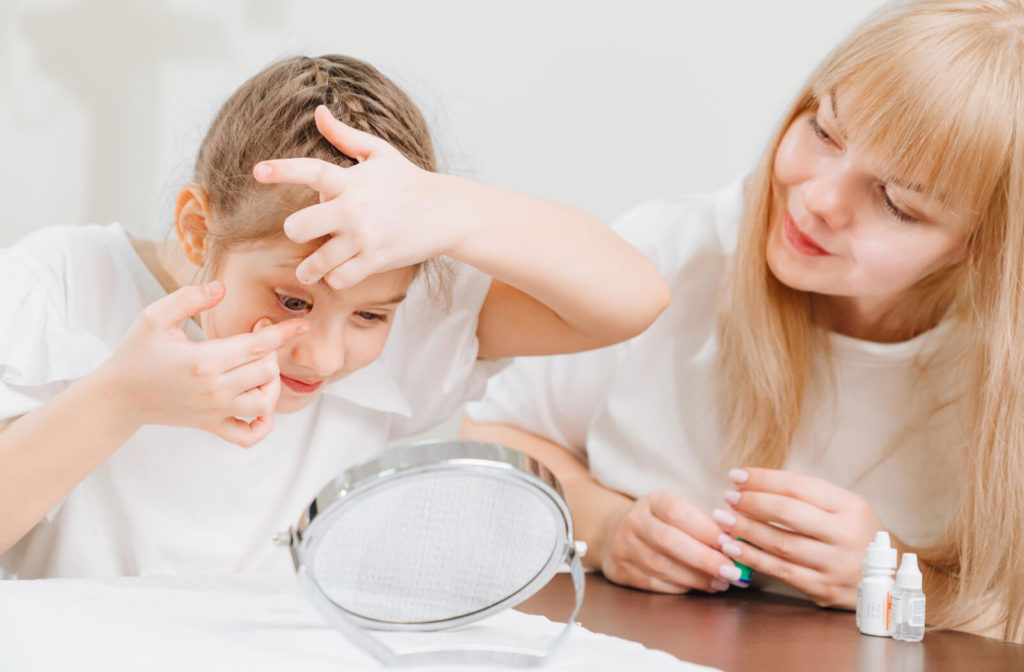As parents, we all want the best for our children, including the gift of good eyesight. Unfortunately, myopia is becoming an increasingly common problem among children, with many facing the prospect of a lifetime of worsening vision.
As myopia typically develops during childhood and adolescence, it’s crucial to take steps early on to slow its progression. But where do you start?
From the importance of spending time outdoors to the benefits of solutions like orthokeratology and multifocal contact lenses, there are many ways to prevent myopia from worsening today.
What Is Myopia?
Myopia, or nearsightedness, is a common vision condition that affects many people worldwide. It occurs when the eye grows too long, causing light to focus in front of the retina instead of on it, making it difficult for people with myopia to see things that are far away.
Myopia typically develops during childhood and adolescence and tends to progress as the child grows, which can lead to worsening vision over time and increase the risk of other eye problems and diseases later in life such as:
- Retinal detachment
- Cataracts
- Glaucoma
However, the rise of myopia is not just limited to children and adolescents; it’s becoming a global epidemic. The prevalence of myopia has increased to over 28% of the population globally, with an estimated 50% of the population being myopic by 2050.
This increase in myopia is not just limited to certain age groups or regions, but it’s affecting people of all ages and backgrounds.
Why Is Myopia Becoming So Common?
What’s behind this global increase in myopia? One theory is that our modern lifestyle and technology are to blame. We spend more time indoors and our eyes are exposed to less natural light than in the past.
Additionally, we are increasingly spending more time in front of screens, whether it’s for work, study, or leisure. Furthermore, genetics also plays a role in myopia, if one or both of your parents are myopic, there is a higher chance of developing myopia.

Preventing Myopia from Worsening
As a parent, it’s essential to be aware of the potential impact of myopia on your child’s vision and take steps to slow its progression. Here are several ways you can help slow the progression of myopia in your child:
- Spending more time outdoors
- Using atropine eye drops (as directed by your eye doctor)
- Orthokeratology
- Peripheral defocus contact lenses
Spend More Time Outdoors
Research has shown that spending time outdoors can help slow the progression of myopia in children. This is because the bright light outdoors helps the eye focus more effectively and natural light outdoors has been found to inhibit the growth of the eye and slow the progression of myopia.
Atropine Eye Drops
Atropine eye drops are another option available for slowing the progression of myopia in children. Atropine is a medication that is typically used to dilate the pupils and relax the muscles in the eye.
When used in low doses, atropine has been found to slow the progression of myopia by inhibiting the eye’s ability to focus on close objects.
Orthokeratology
Orthokeratology, also known as ortho-k, is a non-surgical treatment option for myopia control. It involves the use of special contact lenses that are worn overnight to gently reshape the cornea, the clear front surface of the eye.
This reshaping helps to reduce myopia by changing the way that light enters the eye, allowing for clearer vision during the day without the need for glasses or contacts.
Peripheral Defocus Contact Lenses
Peripheral Defocus contact lenses, also known as multifocal contact lenses, are another option for myopia control.
Unlike traditional contact lenses that correct for myopia by changing the way light enters the eye, peripheral defocus contact lenses are designed with multiple prescriptions in one lens, with the center of the lens being designed to correct for myopia, while the outer edges of the lens create a small amount of blur.
This blur is thought to send a signal to the brain that tells the eye to stop growing. This design allows the eye to focus on objects at different distances, providing clear vision at all distances while also slowing the progression of myopia.
Studies have shown that the use of peripheral defocus contact lenses can slow myopia progression by up to 50% compared to traditional single-vision contact lenses.
Get Help with Myopia Control
It’s important to consult an eye doctor specializing in myopia control to determine the best course of treatment for you or your child. Eye doctors, like those at Total Vision Sports Arena, can evaluate the specific needs of your child and recommend appropriate myopia control options.
They can also monitor the progress of the treatment and make any necessary adjustments to ensure its safety and effectiveness. Book an appointment if you’re interested in learning more about preventing myopia from worsening.



